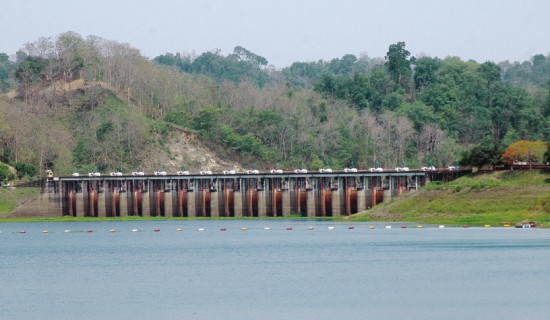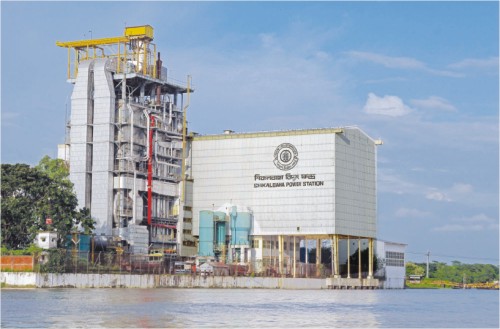Reduce the Red Tape
Nader Rahman talks to Aziz Khan about power generation and the need for a new tendering process
Could you explain the background to the current power crisis?
The cumulative failure of various governments, and their policies and their implementation abilities, in the energy sector as a whole, and in the power in particular, [have led to the current crisis].
If you see from 2001 till date there has not been a single large power project that has been implemented, either by the private sector because of the non-allowance of government to set it up, or by the public sector itself because of their incapacity.
Are there any short-term solutions to our power problems?
We must have a short-term view, mid-term view, and long-term view. The challenge is where do you focus more? In my opinion, the government and people of Bangladesh should focus on the long-term vision, because the demand supply gap is so high -- it is about 2,000 megawatts. Thus it cannot be resolved with short-term solutions.
Short-term relief can be given as a process of resolving this crisis. The government must implement combine cycle base load power plants, which are large in nature, perhaps 500, 600 or 350 megawatts and above.
If they are able to start implementing these and say that they will be completed in 2012/13/14, then they will also need to have some rental power projects, which are short-term in nature to see through the time till the larger projects are done.
What role do you think the private sector has to play in power generation in Bangladesh?
In the modern economic concept of free market economy, the entire economy is supposed to be led by the private sector. Power or energy or infrastructure is only part of those, so certainly I feel the private sector has the ability to help resolve our energy crisis.
Are they being hindered in any way?
If you see the laws and policies of Bangladesh, then the answer is no. But if you see the actual attitude of the government or of the utilities, the answer is yes.
We as a nation must embrace the free market economy and democracy at the same time. Democracy and the free market economy go hand in hand and it seems like we [Bangladesh] have accepted democracy to a large extent, but the free market economy, not so much.
To accept the free market economy, the politicians and the bureaucrats must have much broader understanding and acceptance of the free market economy, which would be reflected in their attitudes by enabling and allowing the private sector to implement solutions for the economic problems of the country.

RSC ANJAN/DRIKNEWS
What is the way forward for private sector-led energy growth in Bangladesh?
Specifically speaking, we have too many bottlenecks and layers of bureaucratic red tape before a large project of any nature can be implemented. In the case of power, there are six layers, first, the tender committee of the utility or the power cell, second the board of directors of Bangladesh Power Development Board, then the Ministry of Energy and Mineral Resources (Power Division), then the cabinet purchase committee, then the honourable prime minister, and subsequent to that, after the negotiation of contracts, the vetting by the Ministry of Law and Parliamentary Affairs.
So we are talking about six layers and in each place there are at least ten people who are required to concur unanimously on all the conditionalities.
In any country that would be a challenging prospect and in Bangladesh they usually don't succeed and in the last nine years these 50 or 60 people could not concur on a single large project.
How would you change the system to make it more effective in the long run and more active in the short run?
The Ministry of Energy and Mineral Resources needs to take up a proposal to the cabinet of the People's Republic of Bangladesh that they need to cut the red tape and instead of six different institutions concurring there should be one or two layers.
There could be one layer at the utility level where the tendering committee and the board could make a decision and then the Ministry of Energy and Mineral Resources should be empowered to accept or reject it.
It would be two layered and it would be amongst people who would be connected with the power sector. What happens now is as it goes to the cabinet purchase committee and the Ministry of Law, there are other influences that come in, and sometimes there is not a full understanding of the need or economics of the project.
People have talked about putting forward expressions of interest rather than traditional tenders to help expedite the process of power generation, what are your views on the issue?
I would imagine that a lot of study should precede removing an existing system; we have a system which is not bad. The implementation of the system is bad, our tendering process has not failed, it is the number of layers that we have put in the tendering process that has failed. So I do not feel that expressions of interest or short-term measures sidestepping the existing methodology are necessary or important.
Do you think a regional power grid is a viable option for Bangladesh?
In the short run the regional grid or the connectivity with India will not provide solutions for Bangladesh. But in the long run this would be a stepping-stone to the resolution of a lot of electricity crisis across the board among all the regional countries. So while the discussions today may not bring in solutions for the next year, this has been a huge step forward towards regional cooperation, opening of minds, towards creating an inclusive subcontinent where each nation provides support to each other for their development.
Do you think something will actually come about?
I am a strong believer in hope and change. Immediately after the Second World War nobody thought that there would be a European Union and even that was not too long ago. Things could open up in a single day. I am happy that the governments of the region are coming forward to support each other. Geographically, the subcontinent is together and they need each other's support to reap the benefits of this geography. I firmly believe that we must rely on each other and support each other to develop together.
There is a lot of talk about the need for power generation, but if and when that extra power is generated do we have the proper infrastructure to distribute and transmit it?
Electricity has three phases: generation, transmission, and distribution. Fortunately for us, at this point in time transmission is a little ahead of generation; it was not so in 2001. Then we had more generation than transmission abilities, today we have been able to implement some transmission networks and are also in the course of implementing other transmission networks of 400 KV which would enable Bangladesh to transmit electricity to various places.

WAHID ADNAN/DRIKNEWS
In the case of distribution, it is easier to enable distribution networks faster. In fact if we get more electricity, the distribution networks will perform better. Having less electricity in the grid huts the distribution network and the transformers and all other equipment using electricity.
The recent plan put forward by government tackles the issue of the generation of power, but lacks clarity on the distribution and transmission: your comments on the issue.
A good plan that has already been implemented is the separation of generation, distribution, and transmission. Today we have the Power Grid Corporation of Bangladesh, which is a publicly listed company and they have done pretty well by expanding their transmission and being a profitable company. Down the stream distribution companies such as Desa, Desco, where privatisation has been implemented and these companies are supposed to be free to move forward. They have the funds and the ability to expand and implement their projects independent of government's bureaucracy. Whether they do so or not is to be seen.
Does renewable energy have a role to play in the energy generation of Bangladesh?
Bangladesh has six seasons and no deserts, therefore solar electricity is not a solution for Bangladesh. As for hydro-electricity, it's a flat country, the largest delta in the world, we have huge opportunities for supplying people with fresh water, but we have very little opportunity for hydro-electricity. Wind requires a lot of space and a lot of wind to put up wind power stations and unfortunately both of them are in short supply in the world most densely populated country. This is not Denmark.
So you are saying in a large-scale way you don't feel that it [renewable energy] can help power generation?
It's not a feeling, I know it. We cannot have large-scale electricity generation from wind or solar energy in Bangladesh.
How important is to be honest about the role the governments have played in the lack of power generation in Bangladesh?
A lot of inefficiency on the part of the government of Bangladesh has created this problem. It's the government who is supposed to provide the platform and the enabling environment to implement these projects. So in that sense consecutive governments have not been able to perform to the expectations of the nation.
Aziz Khan is Chairman, Summit Power Ltd. and Khulna Power Company, he was also the Founder President of Bangladesh Energy Companies Association.
|


